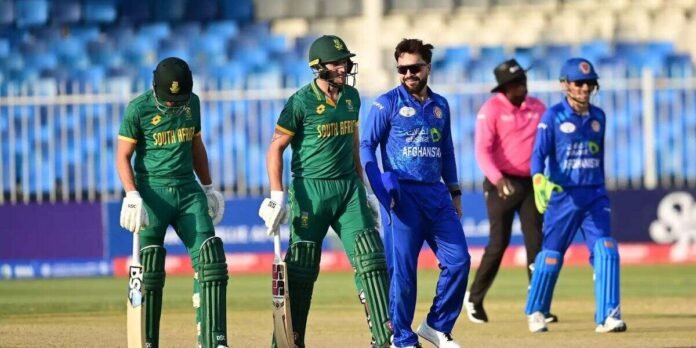Reacting to the Taliban’s treatment of the nation’s population, especially women and children, South Africa will not follow Australia’s lead and refuse to play bilateral matches against Afghanistan.
The CSA argued in a statement released on Thursday that “the advancement of another should not undermine the rights of one gender.”
It is incorrect for some to perceive the CSA’s attempt to protect cricketers from “secondary persecution for the actions of the Taliban” as a contradiction to the principles underlying the international boycott that contributed to the end of apartheid.
This explains the decision to proceed with the men’s ODI series between South Africa and Afghanistan in Sharjah. The Afghans began it on Wednesday, winning handily by six wickets with twenty-four overs remaining. This was their first victory against South Africa in six white-ball matches.
That would have undoubtedly provided Afghans with much-needed delight. Since the Taliban retook power in August 2021, they have faced escalating repression, and that would have filled the void left by the turbulent withdrawal of US forces.
The majority of the crackdown has affected women, as new legislation passed last month makes it unlawful for them even to have their opinions heard. They are forbidden to even go to high school, let alone play cricket.
That is very different from South Africa, where measures to create a more equal society have not stopped gender-based violence but rather have made it worse.
However, unlike Afghanistan, it is not an official policy. Consequently, CSA has “consistently demonstrated a strategic commitment to narrowing the gender gap in sport” and “firmly believes that women’s cricket deserves equal recognition and resources.”
This strategy paid off in February of last year when Sune Luus’ squad made history by becoming the first senior South African team, male or female, to advance to the World Cup T20 final.
CSA would “[continue] its engagement with the Afghanistan Cricket Board (ACB), despite the challenging environment posed by the Taliban regime,” according to a statement released on Thursday.
Punishing innocent cricket administrators and players for the transgressions of a dictatorship that has nothing to lose by doing so is never a good way to progress gender advocacy in the game.
Therefore, the CSA feels that there is no excuse for Afghan cricket players—male and female—to face additional persecution as a result of the Taliban’s actions.”
How does CSA know that the administrators and players in Afghanistan are not guilty? Maybe not unless proven guilty. However, there is proof that the Taliban have gotten inside the cricket board. Days after the regime took over Kabul, government representatives met with the ACB.
According to the most recent reports, there is a conflict among the Taliban’s factions over cricket itself. The eastern branch of the organization is in favor of the game and believes it is a great way to showcase Afghan quality, which is not so among a more powerful and overtly anti-sporting faction of the Taliban in the south.
Thus, there are concerns that the Taliban would outlaw cricket as a sport. If you think that’s unrealistic, remember that they’ve outlawed dancing and music. Not even apartheid attempted to do that.
There are, in fact, significant distinctions between Afghanistan under the Taliban and South Africa during the apartheid era. During apartheid, white people only had the right to vote, and they consistently decided to support and sustain the racial oppression of their black and brown fellow citizens.
People of all races in South Africa played cricket. Still, until the boycott began in the 1970s, only white players could be chosen for the teams that the international community recognised as representing the nation.
There was exactly one occasion when White Cricket publicly disagreed with the administration’s policies, although briefly. On April 3, 1971, in Newlands, a men’s national trials match between the Currie Cup winners Transvaal and the ominously called Rest of South Africa (all white) started with Barry Richards taking a single off Mike Procter.
The players then walked off the pitch in protest at the government’s reminder that players of colour would not be selected for an upcoming October tour to Australia.
White cricket had descended to a depth of denial that was exposed by a statement that said, “We fully support the South African Cricket Association’s application to invite non-Whites to tour Australia, if they are good enough; and further subscribe to merit being the only criterion on the cricket pitch.” To read more, cricket highlights Bet Pro login.
“Non-White” players: who would judge whether they “are good enough”? And what on earth could someone who, by their race, had been permitted to ascend to the top—and who, had they been anything other—know about “merit”?
Once that was done, if not perfectly, the players returned to the pitch, and things carried on as usual. Perhaps they shouldn’t have bothered because the Australian tour was cancelled.
Economic sanctions, culminating in the fall of the Soviet Union in 1991, played a major role in the defeat of apartheid, which included excluding South Africa’s teams from international competition.
If neighbours Angola and Mozambique were no longer Soviet satellites, the West had no incentive to support the apartheid regime.
To read more blog: Key Partnerships: Virat Kohli’s Best Batting Duos
Sadly, far too many South Africans still hold the views that shaped the 1971 Newlands statement. The concept of women playing cricket would have been laughed at by many of the same people, who perhaps still do. However, they wouldn’t forbid them from doing so, in contrast to the Taliban.

